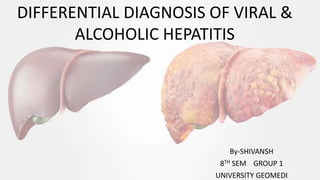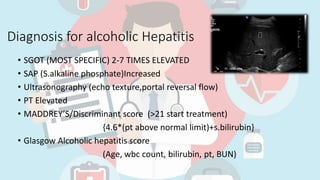Diffrensial diagnosis of viral and alcoholic hepatitis
- 1. By-SHIVANSH 8TH SEM GROUP 1 UNIVERSITY GEOMEDI DIFFERENTIAL DIAGNOSIS OF VIRAL & ALCOHOLIC HEPATITIS
- 2. INTRODUCTION ŌĆó Inflammatory Disease - Mostly asymptomatic. ŌĆó Acute and Chronic (6 MONTHS). ŌĆó Caused by- Hepatitis virus A,B,C,D,E -Heavy alcohol use, genetic, autoimmune,some other infections. ŌĆó Vaccination ŌĆō 3 Dose needed. ŌĆó Complication- Coinfection, Super infection, Fluminant hepatitis Liver cirrhosis, Liver failure.
- 3. CLINICAL MANIFESTATION ŌĆó Poor appetite ŌĆó Nausea & Vomiting ŌĆó Fatigue & Tiredness ŌĆó Right upper Quadrent pain ŌĆó Portal hypertension ŌĆó Jaundice ŌĆó Diarrhea ŌĆó Encephalopathy & Coagulopathy
- 5. VIRAL HEPATITS ŌĆó A & E Spread via Fecal oral Root. ŌĆó B & C via sexual or blood contamination. ŌĆó D Stands only with preexisting B. ŌĆó Precore mutant virus- in Europe & Russia.
- 6. Diagnosis for Viral Hepatitis ŌĆó Serological Study ŌĆó Antigen testing for HBsAg , HBcAg , HBeAg , HCV, HBxAg. ŌĆó PCR HBV/HCV DNA (>20000 IU/ml) ŌĆó LFT (Ratio of SGPT to SGOT >1 ) ŌĆó Ultra sonography- echo texture and span of liver. (Starry sky liver with increased span)
- 7. ŌĆó HBsAg+ IGM anti HBc+ ŌĆó HBsAg+ IgG anti HBc ŌĆó IgM anti HBc+ ŌĆó Anti HBsAg+ ŌĆó IgG anti HBcAg Acute Hapetitis B. Cronic Hepetitis B. Gap period. Vaccinated Remote Inf. Or Low level carrier
- 9. Fulminant Hepatitis ŌĆó IgM anti HBcAg + IgM anti HDV Ag ŌĆó IgG anti HBcAg + IgM anti HDV Ag ŌĆó Features- ŌĆó Encephalopathy ŌĆó Coagulopathy ŌĆó MELD score for transplantion (>17) (Bilirubin, PT, S. Creatinine) COINFECTION SUPERINFECTION/FULMINANT
- 10. Alcoholic Hepatitis ŌĆó 20 % cases of total , Male-160 gm/day , Female-20 gm/day . ŌĆó HCV, Genetics, Obesity. ŌĆó Macro vesicular fat deposition. ŌĆó Mallory hyaline bodies. ŌĆó Features-Right upper quadrant pain,nausea,vomiting,jaundice absent -Portal hypertension, splenomegaly, Caput medusa. ŌĆó -
- 11. Diagnosis for alcoholic Hepatitis ŌĆó SGOT (MOST SPECIFIC) 2-7 TIMES ELEVATED ŌĆó SAP (S.alkaline phosphate)Increased ŌĆó Ultrasonography (echo texture,portal reversal flow) ŌĆó PT Elevated ŌĆó MADDREYŌĆÖS/Discriminant score (>21 start treatment) {4.6*(pt above normal limit)+s.bilirubin} ŌĆó Glasgow Alcoholic hepatitis score (Age, wbc count, bilirubin, pt, BUN)
- 12. Treatment ŌĆó Hepatitis B ŌĆō if HBeAg+, PCR DNA = >20000IU/ml +SGPT*2 times - Tenofovir(300mg/day*48week) /Entecavir. ŌĆó Fulminant Hepatitis - Lactulose (NH3 binder) ,Rifaximine(bacteriostatic) - enema ,IV L.O.L.A(Ormithine and aspartate for urea formation -IV 10% glucose, Frozen plasma ( vitamin k not helpful) ŌĆó Alcoholic Hepatitis- PREDNISOLONE (3mg/day*4 week) -Naltrexone(deaddiction) -TNF A INHIBITOR












